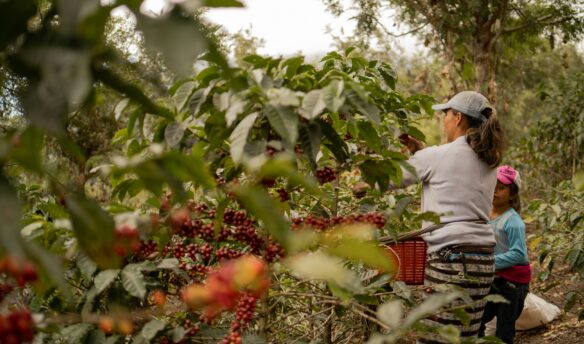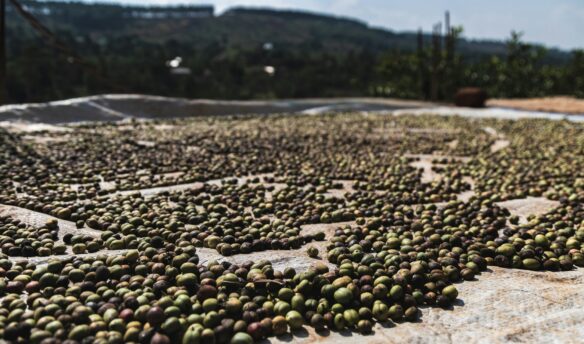Want to use the bathroom? That’ll be $5. Plus, Starbucks faces a lawsuit over its ‘ethical’ sourcing practices, and Korea’s booming coffee industry attracts big international brands.
‘Starbucks Sued for Allegedly Using Coffee from Farms with Rights Abuses While Touting Its ‘Ethical’ Sourcing’ – via NBC News
A consumer advocacy group has filed a lawsuit against Starbucks for false advertising, alleging that the company is misleading the public by touting its “100% ethical” sourcing commitments while knowingly sourcing coffee from suppliers accused of committing human rights and labor abuses.
The case, which NBC says was filed in the District of Columbia by the National Consumers League (NCL) “on behalf of American consumers,” cites reporting from various Starbucks sourcing scandals. Past reporting on Starbucks’ sourcing practices has uncovered instances of abusive and unsafe working conditions as well as modern slavery and child labor on coffee and tea farms in Kenya, Guatemala, and Brazil. Despite these reports, the lawsuit alleges that Starbucks has continued to work with implicated suppliers.
“Over the last decade, investigative reporters and government officials have found extreme abuses on farms and co-ops that supply coffee and tea to Starbucks,” NCL CEO Sally Greenberg said, according to Daily Coffee News. “These abuses range from Brazil, to Guatemala, to Kenya. Starbucks has had every chance to correct its ethical sourcing practices and update its C.A.F.E Practices standards, but it has failed to do so. At the same time, Starbucks has made its supposed commitment to ethical sourcing a key part of its brand identity and marketing.”
Starbucks said they plan to challenge the charges, noting that “we take allegations like these extremely seriously and are actively engaged with farms to ensure they adhere to our standards.” The company also claims they’ve worked with their sourcing partners to address labor and human rights violations. A story in Reporter Brasil from 2022 uncovered multiple labor violations and forced and child labor on at least four farms under Starbucks’ Coffee and Farmer Equity (C.A.F.E.) sourcing standards program. In response, the company said it would “thoroughly investigate” and “take immediate action.” Starbucks also told NBC it had “since taken corrective action in both Guatemala and Kenya.”
The issue of labor violations in the coffee supply chain is not unique to Starbucks, Genevieve LeBaron, director of the School of Public Policy at Canada’s Simon Fraser University, told NBC. “I think it is really hard to have an ethical supply chain,” LeBaron said. “And I would say, you know, a lot of the reason for that is that, especially in agriculture, there’s a sort of status quo of sourcing goods way below the cost of actually producing them. And as long as you have that, you’re gonna have problems.”
‘Global Brands Knocking on Door of South Korea’s Polarizing Coffee Market’ – via Business Korea
We’ve written about the booming coffee scene in South Korea—the increasing number of cafes is causing price wars, and iced coffee’s trendiness is influencing language choices. While home-grown companies have primarily driven coffee’s popularity, the word “growth” is like a bat signal to the big international brands now targeting Korea for expansion.
Starbucks has been in Korea since 1999 and has nearly 2,000 stores. But now, Business Korea reports that other North American brands like Tim Horton’s, Dunkin’, Peet’s, and Intelligentsia have either opened stores or are planning to open stores in the country. Fast-growing Chinese brand Cotti Coffee also expanded to Korea in 2023, where it joins the other foreign companies battling it out with Korean chains like Compose Coffee and Mega Coffee for a slice of the market.
And what a market: the average Korean adult consumed 405 cups of coffee in 2023, more than double the global average. To service this demand, Korea boasts almost 100,000 cafes and imported $1.3 billion worth of coffee in 2022—an increase of 42.4% over the previous year.
How the influx of foreign companies will impact the already-saturated market remains to be seen. However, one industry insider interviewed by Business Korea notes that while consumers are likely to be receptive, the companies need to understand the specifics of the market. “Korean consumers tend to be open to new experiences and are not afraid to try new things. Global brands are using the Korean market as a test bed to expand into other countries based on their success in Korea,” the source said. However, “if brands do not adapt to rapidly changing consumer trends and fail to localize, they may struggle to achieve long-term success.”
‘This App Lets Restaurants and Coffee Shops Charge to Use the Bathroom’ – via TechCrunch
Would you spend $5 to use a cafe’s bathroom?
That’s the pitch from a new app called Flush, which allows coffee shops, hotels, and restaurants to rent out their bathrooms while letting users search their locality for available spots. Elle Szabo founded Flush after she became frustrated trying to find public restrooms while on diuretic medication. “If being on this medication was a problem for me,” Szabo told TechCrunch, “I wondered how many other people it was a problem for.”
Szabo is pitching the app as an additional revenue stream for businesses and says it “provides a unique means for attracting new customers without any extra marketing.” However, it isn’t clear how businesses are supposed to manage the whole thing—someone will need to monitor usage, control access to the bathroom, and deal with possible problems. Techcrunch reports that Flush is exploring using smart locks to enable self-service and insurance to cover potential damage.
There are also accessibility and equity issues around charging for bathroom access. While paid toilets are common in Europe, they’re also relatively cheap—around one euro or less—and the United States hasn’t widely adopted such systems. TechCrunch notes that in the face of a lack of public restrooms in cities around the US, “privately owned restrooms have become a vital resource for homeless populations.”
TechCrunch also points out that similar ideas have been tried in the past, without much success. In 2017, a startup called Good2Go raised millions in funding and partnered with, among others, Peet’s Coffee for a similar paid bathroom venture. However, the company “eventually pivoted to selling general door access control tech after failing to make the economics work.”
More News
‘The Barista League Is Back With 12 Stops For 2024‘ – via Sprudge
‘Costa Rica’s 2023/24 Coffee Harvest Seen Down 13% on Early Rains, Labor Shortage‘ – via Nasdaq
‘JDE Peet’s Completes Acquisition of Brazilian Coffee and Tea Business‘ – via FoodBev
‘The Starbucks X Stanley Tumbler Is Causing Chaos At Target’ – via Sprudge
‘An Opera Production About Coffee is Taking Over an NYC Coffee Shop‘ – via Daily Coffee News
‘Black Sheep Coffee Poised for US and UAE Launches as Annual Sales Double‘ – via World Coffee Portal
‘Blank Street Coffee Relied on Low Costs to Grow—Now it’s Betting on Subscriptions’ – via CNBC
‘AI Comes to Green Coffee Sorting with the Avercasso CS One’ – via Daily Coffee News
‘Thermoplan Black&White4 CTS Announced New World Latte Art Championship Espresso Machine‘ – via World Coffee Portal
The Week in Coffee Unionizing
The National Labor Relations Board has denied an attempt to decertify the union at Starbucks’ Mall of America location in Minnesota. A group of baristas, many of whom were hired after workers voted to join Starbucks Workers United, filed the petition with assistance from the National Right to Work Legal Defense Foundation, an anti-union advocacy group. Workers can apply for a vote to dissolve their union if more than a year has passed without an initial bargaining contract and more than 30% of employees sign the decertification petition.
However, the labor board can block the petition if it suspects unfair labor practices. According to an analysis from Bloomberg Law, the NLRB’s ruling to deny decertification stems from the litany of complaints, allegations, and rulings that have found Starbucks in violation of labor laws—the company’s actions mean that any decertification vote would be unfairly tarnished.
The National Right to Work Legal Defense Foundation has helped workers at other stores attempt to decertify their unions, with mixed results. The NLRB dismissed a petition at Starbucks’ Reserve Roastery in Manhattan as well as two others in New York state. In Philadelphia, however, the group has had some success: workers at Good Karma Coffee House voted to disband their union in September, and this week, Workers United opted to end its involvement with one Ultimo Coffee unit after a majority of the cafe’s staff signed a decertification petition.
The number of Starbucks stores filing decertification keeps creeping up—it’s at 20 now, according to figures provided by Starbucks—but other stores continue to unionize. There have been multiple filings and elections in the past week alone, from California to Indiana and Pennsylvania, and the total number of unionized locations now stands at over 370.
Coffee and the Climate Crisis
The International Coffee Organization published its biannual Coffee Report and Outlook in December 2023, which provides an overview of global coffee production and consumption statistics. Among other things, the report looked at the impact of weather on coffee production over the 2022/23 growing season.
Unsurprisingly, adverse weather events like floods and drought beset coffee-growing regions around the world. Although it doesn’t mention climate change by name, the report is littered with examples of unreliable weather causing issues for growers: too much rain in India, Peru, and Colombia decreased their output; drought in Uganda and Côte d’Ivoire had a similar effect. In Côte d’Ivoire, which produces more coffee than El Salvador or Kenya, yields fell nearly 65% due to drought.
Honduras managed to increase production by nearly 15%, despite “labour shortages, high fertiliser costs, heavy rain and reports of a resurgence of coffee leaf rust disease.” According to the United Nations, the labor shortage issue can at least partly be explained by climate change. In Guatemala, according to the Coffee Report and Outlook, “production is falling due to many of the same issues faced by the origin’s Central American neighbours, namely high labour costs, availability of labour and erratic weather.”















